This article is more than 5 years old.
Day Two offered another full day of sessions and since everyone here from ZSR seems to have embraced Roz’s theme approach to reporting, I’ll roll in my unreported day one stuff into this post. One of my themes has been distance education because our workgroup is putting together a plan to ready us for when DE arrives at Wake. It is a topic that surfaced in many sessions, even ones where it wasn’t the main topic. I attended two panel discussions on DE: Fostering Library as Place for Distance Students and Going the Distance: A Closer Look at Uniting with Remote Users. One of my big take aways from both of these is that UNCG’s Beth Filar-Williams was on both panels, alerting me to the fact that we have a great resource person right in our back yard! You can see from the presentation slides (linked to the session titles) that she is a very pro-active DE coordinator for UNCG which has a very hybrid model with varied populations of distance students. They have 950 purely distance students but plenty of others who do some classes online. An interesting fact is that all new instructors to UNCG are told they will be teaching online at some level.
Lynn reported on data curation, which is another hot topic these days. In fact, I had suggested it as a topic for a future special issue of JWL (Journal of Web Librarianship) and Erik and I are going to do a summer project to look at existing data sources. So I jumped on the opportunity to go to the panel session Roles for Librarians in Research Data Curation. Different institutions are taking different approaches and it was reflected in the titles of the various speakers: Data Research Scientist, Research Data Project Librarian, Digital Repository Librarian, and Research Data and Environment Sciences Librarian. After reviewing the literature, they distilled the roles for librarians in this field down to behavioral scientist (one who understands the needs of the researcher), advocate (one who articulates the value proposition, does best practice training, develops standards, markets services to users), broker (a concierge who works with other units to provide services), and the more traditional library focus of collection builder (maintains awareness of research on campus to get researchers to deposit data and provide long term custodial preservation and access).
Another of my conference themes has been about the impact and value of academic libraries to the larger institution. So the session that was to present a new ACRL report on the environmental scan that is done every two years was a pull for me. Unfortunately, it was also a big pull for too many other people, so the room was packed and I ended up perched on a corner shelf for the duration. The convener was surprised so many people came and had only prepared 25 copies of the report draft, which wasn’t quite final even though the purpose of the session was to present the final findings. But they promise it will be out in the next couple of weeks. Instead, faculty from the Drexel ischool made some remarks about themes they found in the report’s draft:
- transforming librarians as well as the library. Traditionally we have been seen as those that serve. It’s time to think about ourselves as leaders in the academy, among those that make things happen
- Higher education is a business so what can we do to contribute to the student experience to help them choose to come to our school and to stay there? (right on my theme of impact and value!)
- Assessment and accountability, coupled with outcome based approaches
- Partnerships. Libraries are the places for building communities. We should think of ourselves as mentors/coaches and reach out as being the place where there is cross-disciplinary intersection in a Switzerland-like (neutral) environment.
- Simplify. It’s time to work seriously on how we can make it easier for our users to get what they need.
- Building the profession and looking to the future. There are major demographic changes in higher education and we need to reflect that diversity. We also need to figure out how to compete with other professions to attract the best and the brightest.
I will continue to anticipate the actual report so that I can see how they tied in these themes for myself!
The rain finally let up a bit in the late afternoon, so I grabbed my camera and headed out for some fresh air and photo opportunities. My main destination was Love Park, which is named after the replica LOVE statue that is there.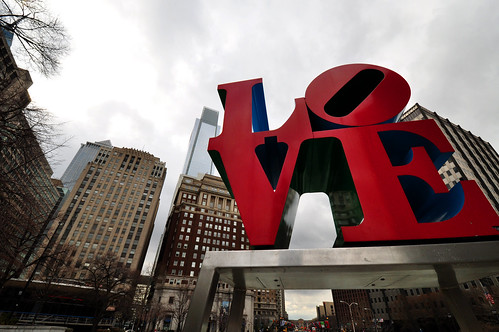
From there, I spotted the Philadelphia Museum of Art “just down the street” so hiked there (it was a bit further than I thought!) to run up the stairs that were made famous in the Rocky movies!
I had to double-time it back to the hotel to meet up with my fellow ZSR conference colleagues for the ULS social, followed by the ACRL All Conference Reception, which was held at the Constitution Museum. I’ll end with one final picture and challenge you to find two of our colleagues in it!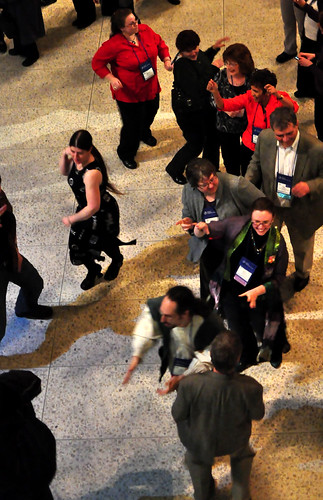
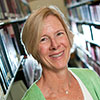
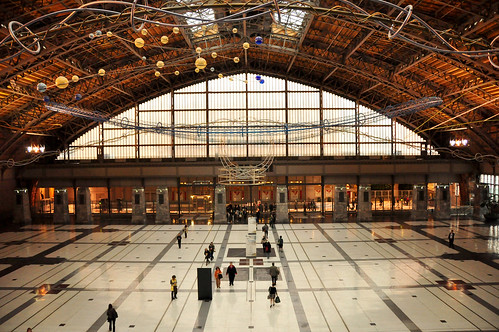
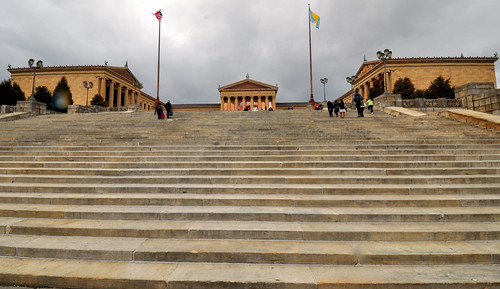
4 Comments on ‘Susan’s ACRL Day Two With a Little Day One Spillover’
Twirl, Molly, twirl!
Thanks for this recap Susan. I’ve seen data curation on the horizon for some time and appreciate your discussion of that topic. I also was intrigued by the comment from Drexel- “it’s time to think of ourselves as leaders in the academy, and those that make things happen.”
You should have gotten someone to take a picture of you on Rocky’s steps!
It seems to me that ZSR reflects the key themes of the environmental scan. Thanks for the hard-won sneak preview of the real final report.
It is good to have colleagues who are watching closely rising tide of DE. Hopefully librarians will be/are being invited into the conversations that shape how DE is put into action on their campuses.
Thanks!
Thanks for sharing the presentations and documents. I am looking forward to more discussions about data curation!